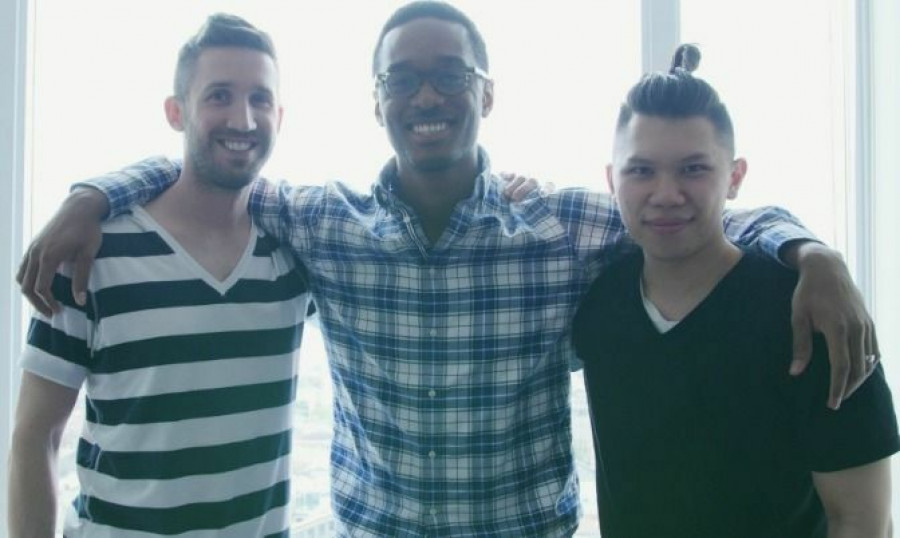Sam Newman Bremang, a self-described stats nerd, affectionately known as the “flat-top philosopher” is an exception.
In 2016 he decided to leave his management consultant job to start a mobile gaming company with two of his friends, Ian Clarkson and Lyndon Lee. They created 1UP Mobile Inc and “Draft Rivals: Fantasy Basketball” was born.
Listen to the audio version of this article:
It’s been less than a year since its launch, but Draft Rivals has already gone global and is now played in 155 countries. It’s been downloaded more than 120,000 times. It is featured by Apple under 'New Games We Love' (Sports) and featured as a Google Play recommended sports game.
Draft Rivals is a mobile game for die-hard basketball fans but with a twist that separates it from the average fantasy sports game.
ByBlacks caught up with Sam to talk about his journey into the world of entrepreneurship and mobile gaming:
How is Draft Rivals different than other fantasy sports games?
Fantasy sports is a great idea but completely missing the mark with people who are younger, diverse, or female. So you look at who's actually watching these sports and overlay that information with who's playing mobile games and it's the same audience. If you take fantasy sports and go beyond owning a player and merge it with mobile games and all the things that make it fun, addictive, and social you can appeal to this lost demographic, our demographic, and make something that's really cool that they've never experienced before. That was the foundation. Because we're outside of that core demographic we found a different way to do it that appeals to people like us.
So how does it work?
Instead of sitting around and picking players, you pick players by opening card packs, like when you were a kid, and that's how you make your team. Instead of picking one team and having them all season you pick a team every day by playing a mini game against another player, and that determines your team for that night and the winner is chosen that night. We tried to make it in a way so that everyone can enjoy the game, if you’re a stats nerd, a hardcore sports fan or just in it for the social aspect.
{gallery}Draft Kings:::0:0{/gallery}
How did you convince Ian and Lyndon to leave their jobs and pursue this with you?
Lyndon and I go way back. I was in high school with him and we've always thought of doing something together because I was into business and engineering and he was always into fashion, art, and more creative stuff. We thought those things complemented each other so when it came up he was ready to jump in. Ian and I were introduced by a mutual friend during undergrad. We decided we wanted to do something independent for ourselves and that was the crux of it. We talked and worked on things on a friendship level but the hard part was the sacrifices we've had to make for this vision. Lyndon moved from Oakville to Vancouver to live in our second bedroom five months after my wife and I got married. Then there are financial sacrifices, all three of us quit our jobs. I was on target to make about $250,000 this year (at my old job)—so we put a lot of ourselves into this. The base of this has been trusting in each other and what we're doing. But those early days when you've just given up that salary, that's when things are tough.
For someone who's considering starting a company or a start-up, what advice would you have for them when it comes to dealing with obstacles?
Coming from my background and training in engineering and consulting which is all about data and numbers, a big lesson I've learned is not to lose sight of emotion which my wife (who's a musician) and Lyndon helped me with. I've had to learn how to understand my own emotions, read the emotions of others. Having that skill helps in two ways. 1. When thinking of an idea, you should consider: does this idea emotionally resonate with you? The idea of doing a start-up, taking that risk, does that emotionally trigger something inside of you? We did a start-up weekend where you have 48 hours to come up with a business and it was the best 48 hours of my career. I thought to myself "this fits, this works for me" I loved the chaos, the uncertainty, it just emotionally hit with me. And 2. "Can you make other people feel that emotion?" When you tell people about it do they get excited? What do they say about it? And when they get excited do you feel that? It's the emotions that keep you going.
Are there things you took away from your consulting job that has helped you with your start-up?
Consulting is very numbers-driven but a people aspect that comes up is managing a team. When managing a team you have to learn to pay attention to what they call in business the 80-20 rule, 80% of your problems are caused by 20%, so tackle what constitutes the biggest or most important problem and don't worry about the rest. A huge part of a start-up is meeting important people and selling them on an idea quickly and that their limited time should be spent on you and that's a lot like consulting.
You grew up playing a lot of sports, both team and individual, what are some similarities between playing on a sports team and being on a team with your friends to build a company?
It's interesting, I do find the three sports I played, baseball, basketball and track, to have very different models of teamwork. Our start-up is like baseball; I do the front-end and the business stuff which is individual but I rely on Ian and Lyndon to do the design and the back-end stuff because I can't do my job without them.
All three of you have different backgrounds. Can you talk a bit more about why diversity in your company is so important to you?
It comes from this notion that the right way to run a start-up is to start with a group of like-minded friends with different skill sets but to minimize tension have a monoculture and make sure you all believe in the same things. We never believed in this and we've been completely different; diverse in terms of ethnicity, experiences, culture and it’s helped us grow the product. For example, if it was just me the app would be very sports-focused and stats heavy. Lyndon has a background in fashion so the app looks pretty and unlike other sports games. The social side and community come from things we've borrowed from PC gaming. Ian is into PC games so he brought his knowledge from that culture. That dynamic challenges my thoughts and perceptions. So we never make a decision and just run with it, we have three different views and ways on how to do things. Maybe it’s slowing us down, and if everyone agreed we could go faster but for us going faster wasn't the goal. It was getting to the right decision, so we take time to argue and meld our ideas together to come up with a better product.
When you look at how the app has been received and how the company has grown, how similar is where you are now to where you thought you'd be when you first imagined the company?
The idea has never changed, though we never knew we'd have the product we have today. We started off with a betting model like March Madness and we thought "how can we make this more fun and accessible" and we started tweaking things. We never had a mobile game in mind until we started talking with the community here in Vancouver. So the product is different but the idea is the same. The success of launching globally has been really cool.
Where do you think the future of apps and mobile gaming is heading?
I think what's happening is that technology goes first, it creates things that we don't know how to use, like chat rooms in the early days, it gets weird and then our humanity catches up with it. We learn how to put our humanity into it like the social constructs. What matters then isn't the technology but the social aspect. The reason Snapchat is winning right now is because it's fun and it lets people be creative not because of the technology or any algorithm they run. The people who are gonna win aren't the techies or the programmers it's whoever can inject creativity, spontaneity, make it interesting and touch people on an emotional level, those are the people that are going to stand out.
I think technology is completely transformative because in the old world where technology matters, being big matters. And that's where corporations win, which are usually run by older white men. So to succeed in that world you needed to move up the corporate ladder and impress people along the way but now technology allows everything to be commodified, everyone has access to it. All that matters is putting yourself on top of that, being creative, saying something interesting and putting yourself into the product. Individuals can do that, not just corporations and people from different backgrounds. So there's a huge shift of power from corporations to individuals and from technology to creativity. And that benefits minorities, immigrants, women, everybody.
What’s been the best part of this journey for you?
I think everybody needs to have some way to express themselves and I didn't recognize that in myself at first but the expressive part of it has been the most gratifying thing for me. Being in a successful engineering corporation you don't feel that success because you're not expressing who you are. You have a task and you have a goal. But with this, we're so close to it, we're putting ourselves into it, we're interacting with users; we're really expressing who we are in the product and that's something I underestimated. I didn't know I needed it in my life and now I can't imagine being without it. If you don't have it you're like a zombie.
Sam and his team have also just launched a Major League Baseball version of the game. You can find both versions in the Apple App Store as well as Google Play.

 By
By 





